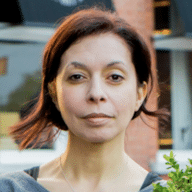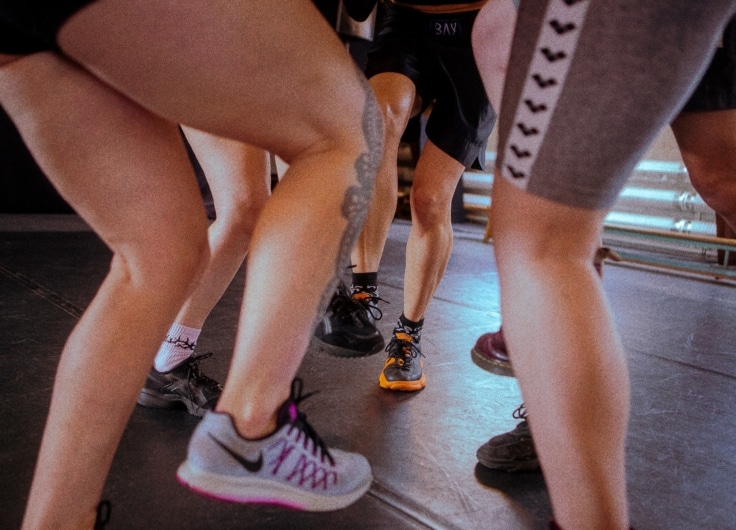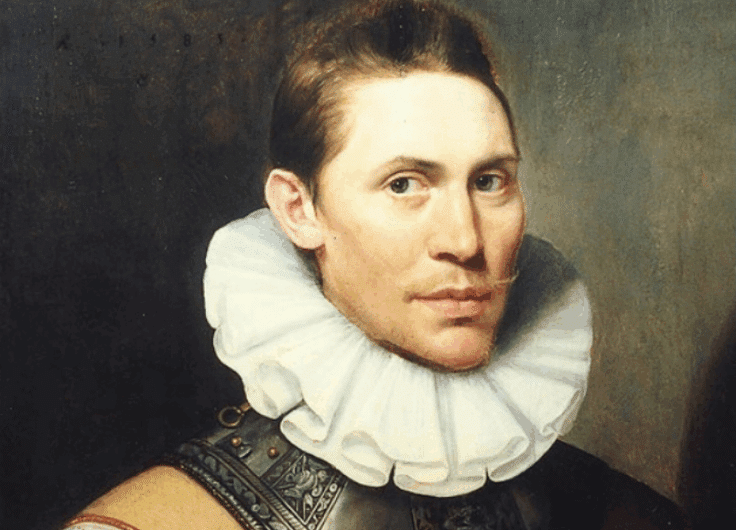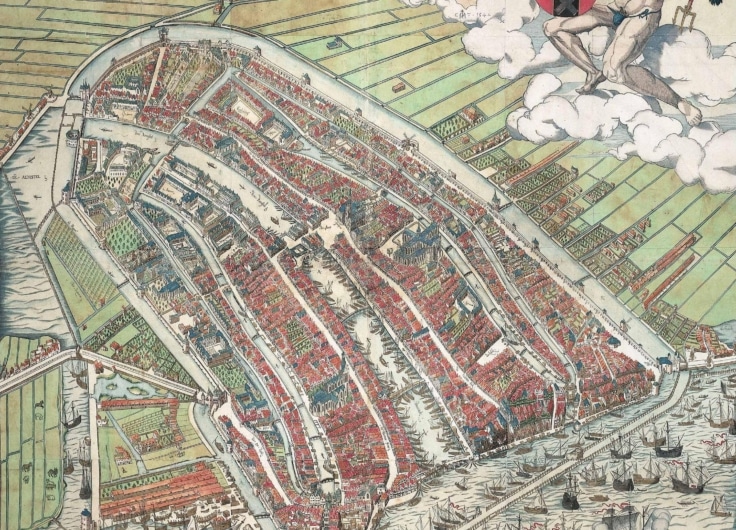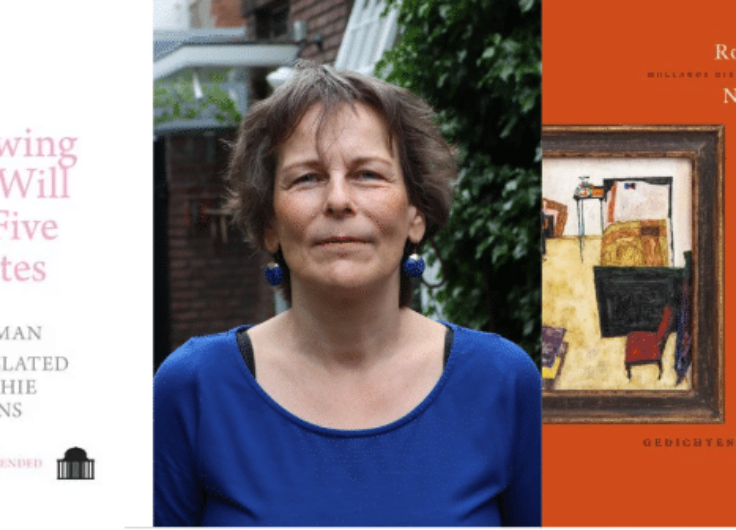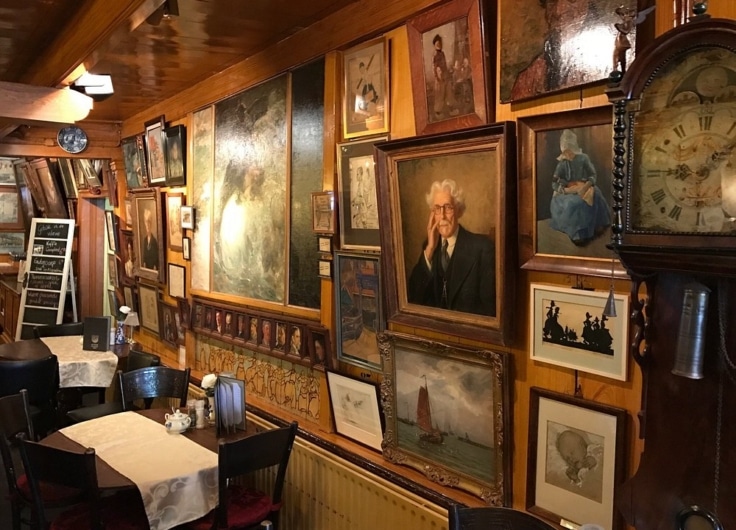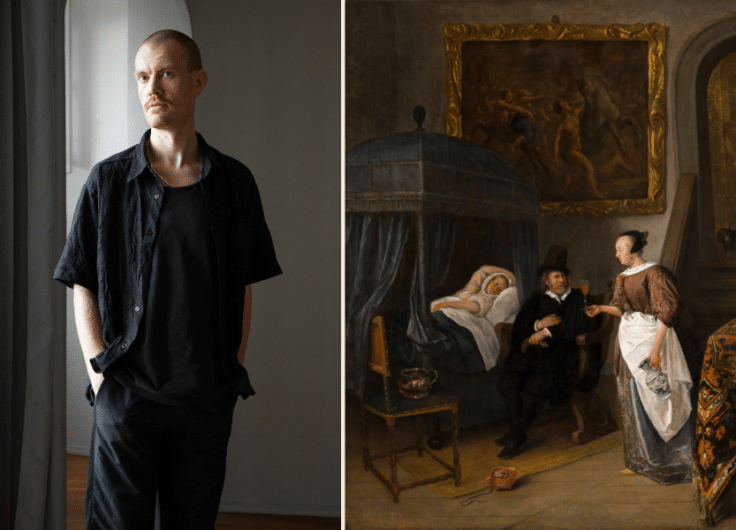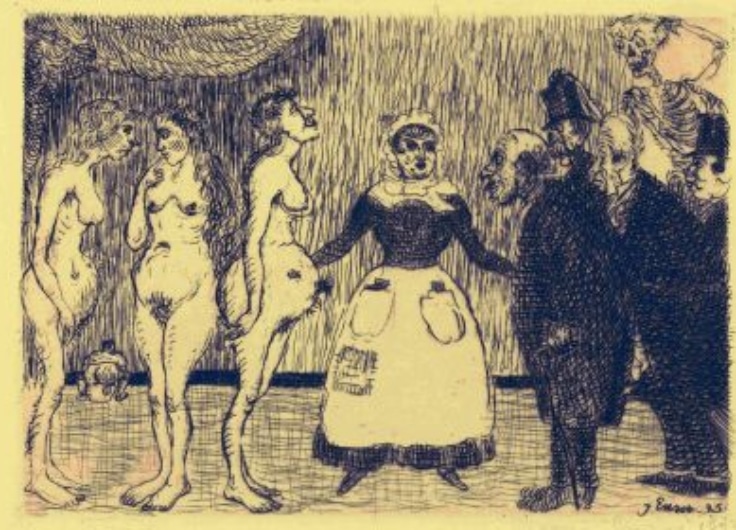Right-wing extremists and Muslim extremists share the same origin: fear. The mutual fear for the other groups’ dominance provokes revisitation of their own identity, whether this glorifies a white past or adheres to a fundamentalist interpretation of religion. Moreover, both extremes break away and penetrate deeper into society, even into institutions. Meanwhile a much larger problem is overshadowed: inequality.
A phone booth in Bornem. This is where I first came into contact with extreme right. I was barely sixteen when I stood in a dusty, glass-doored phone booth cubicle on that sunny afternoon. With the black telephone receiver in my hand, I dove deep into my pocket for a twenty Belgian franc coin. The efforts were in vain. Three beeps followed and the connection was lost. I put the phone back on the hook, turned around and stood fixed to the ground, with only one thought: Why didn’t I see these men coming? There were three of them and they looked like triplets. Their heads were shaved, they wore bomber jackets and had thick rings with Germanic crosses around their fingers. Suddenly, they stood in front of the door of the phone booth I was in.
The window was covered with messages written in permanent marker, including all kinds of telephone numbers, initials, a heart with arrow and the names Kevin and Miranda, forever. Love lived colourfully inside the booth, but outside stood a symbol to hatred with rolled-up trouser cuffs. Three pairs in a row. I recognised the middle guy of the trio by face and name. He looked at me, grinned and whispered “White Power”. His grimacing look gave me the shivers. I could feel the sweat trickling down my back when he lifted his upper lip. Yet, I pulled open the door and stepped outside, seemingly calm. My teeth will be lost forever, I thought. I was expecting to get a few whacks, but the men compliantly stepped back. Strange. One of them cried out to me, like a dog barks as quickly as its owner leaves: “And now you’re gone, hopefully forever!” I immediately took off; I couldn’t wait to get out of there.
 March against Marrakesh, Brussels, 17 December 2018
March against Marrakesh, Brussels, 17 December 2018© Bas Bogaerts
Black days
It was just that one incident when I stood face to face with them. Back in the 90’s, I sometimes saw Nazi skinheads at a party in the region of Klein-Brabant (“Little Brabant”) and beyond. Their shaved heads popped up after Black Sunday in 1991, when far right political party Vlaams Blok scored their first big election win. They didn’t make any noise, yet their presence was already offensive enough between the grungy people and punk rockers that were in favour of an open border policy and multiculturalism. Promptly, these in-terms-of-number-negligible neo-Nazis were gone, in no more streets or party halls to be seen. Were they swept away by a historical event of a different magnitude?
Ten years after that Black Sunday, a dark event took place, during which thousands of people died, a day that bears its date as name: nine-eleven. Since then, almost everyone has been talking about radical Islamism. Skinheads disappeared in a puff of smoke, and the radical Muslim man took over. Having a beard, and dressed with a long tunic or simply according to Western dress codes, his invocation of the almighty God became the new caricature sketch of the growing Islam. I met many of these radical men. They wanted supremacy of Islam. Just wait; they often say, by God’s will, Europe will soon be ours. Soon, insja’allah. They used very few words, yet with a suppressed grin; Muslim power will dominate.
Islam, even in its radical form, is now a Western body of its own
Islam is indeed a growing religion – according to some studies even the fastest growing religion. A prognosis: by 2050 there will be almost as many Muslims (2.76 billion) as there are Christians (2.92) worldwide. By that time, almost 12 percent of Belgians will be Muslim.
This means that the Muslim population of 2010 will have doubled in size, writes the Pew Research Center.(1)
“Islam no longer only refers to Muslims. For Western societies, Islam is no longer the religion of the Other; it is now an endogenous social reality”, says the French professor Hela Ouardi.(2) Let me put it this way: Europe is not becoming Muslim, but nor does it remain homogeneous white. We share the continent, self-sustaining, with forces and processes from within. Islam, even in its radical form, is now a Western body of its own, and some see this as a threat. Muslims should no longer integrate but be rejected, as if they are a threat to the fabrics of European society.
Return to identity
By rejecting the other, interconnectedness is evoked in the process of identity revision, better known as identity politics. This is a form of politics in which people become focused on defending their in-group interests, and in which an identity is sharpened in order to oppose another. In 2008, the Dutch researcher Amy-Jane Gielen showed that the search for identity is a crucial factor in the radicalisation process, among Muslim extremists as well as the extreme right.(3)
Both radical groups experience a similar process of identity formation. Put simply, it comes down to this: I only become “I” when we are against them. Islamic extremism creates a common enemy by averting the West, which they consider to be corrupt, whereas the extreme right is afraid of Islamisation and political correctness. Particularly in the latter case, the white man – middle-class, middle-aged – bears the brunt. Other group identities, mainly from all kinds of minorities, put him on the spot. They even go back to a past of colonisation, slavery, exploitation and war; a past in which white men and their capitalist models of society were never far away. It’s not that other nations and cultures go uncriticised, but it’s the large-scale destruction and domination of the white man that makes him most susceptible to critique.
This dominance also creates certain privileges. The privilege of discriminating, for example, in the workplace and on the housing market; but also in education, private life, the public space, the health sector, sports, culture, and so on. The exclusion takes place based on gender, ethnic-cultural or migration background, nationality, socio-economic position, sexual orientation, religion, and age. According to these discriminated group identities, historical privileges have to be corrected or questioned, at least. Or they have to be restrained with stricter discrimination legalisations and a greater inclusion of all kinds of groups in institutions, companies, and governments. Men – especially white ones – have become the errata of a new, future story. The white man is no longer an exception, but common in Europe. He is no longer the privileged norm, the one that sets the tone; he doesn’t fit in nowadays and his dominant embodiment of governments and institutions is restricted. He is almost like a stranger in his own continent, taking the offensive position. As he starts to consider himself as an endangered species, defence becomes his best attack, with the defence of Europe first.
Virtual activism
Defend Europe. That is one of the actions of the young right-wing Génération Identitaire, a political group that merged with other Pan-European identity movements that arose in the mid-2000s as a counter-reaction to jihadism. They claim to fight against Islamisation and mass immigration. Right-wing extremist groups that rally their supporters with xenophobic feelings, is not a new thing. However, new movements around these issues have recently been sprouting up everywhere; just think of civilian movements such as the Soldiers of Odin. In Flanders, Schild & Vrienden is the most successful identitarian movement. Their strength lies in virtual activism: spreading hate messages via social media. I’m no longer surprised in a public telephone booth, now I’m suddenly the target of Internet trolls, of even hacking.
The salvation of the extreme right also takes place in politics
In real life, the mobilization power of this movement also increases. Early October 2018, the headquarters of SOS Méditerranée, one of the aid organisations that saves migrants from drowning in the Mediterranean Sea, was attacked and temporarily occupied in Marseille. The perpetrators were young people from the right-wing extremist Génération Identitaire with roots in France and branches in the Netherlands and Germany. A news story, you might say at first. In the same week, however, the Dutch security service AIVD announced that a climate has developed in the Netherlands in which right-wing extremism had rapidly spread.(4) German, British and Swedish security services confirmed this trend. In Germany alone, there are more than 25,500 people who are no longer ashamed of idolizing neo-Nazi or fascist ideas. Some are prepared to take the path of violence to “clean up Europe”. Weaponization of right-wing extremist militants and sympathisers is also expressed, for example, in the success of shooting clubs in the Netherlands and Flanders.
The Belgian state security has also noticed of the rise of identitarian movements. A recent report describes them as following: ”Following the example of the alt-right movement in the United States. A new manifestation of the radical right or ‘extreme right in a tailored suit’.” This phenomenon brings me back to the intimidating meeting in front of the telephone booth. Now, more than twenty years later, I sometimes see the then-broadly-grinning-village figure walking around in my municipality. There are no longer skinheads at his side, but children and stepchildren. It is almost touching.
Institutionalisation and expansion
Less endearing is the fact that the salvation of the extreme right also takes place in politics. The right-wing extremist political groups differ from country to country, partly because of the different traditions and resistance they encounter. Ultranationalist parties are in power in Poland, Hungary and Slovakia. Their agendas largely coincide with those of the right-wing populists in Western Europe. The big difference is, however, that these are no opposition parties, but established parties. At the European level, the parties join forces in the ENV (Europe of Nations and Freedom). In his research The Racist Mind Revisited (2002), in which Raphael Ezekiel portrays neo-Nazis and Ku Klux Klan groups, the American psychologists observed in 2002 that the ultra-right movements are undergoing a slow institutionalisation.(5) Calling for violence is no longer an end in itself. Rather, they focus on participation in social structures of society. This requires self-reflection from us as citizens and voters. Ezekiel uses a well-known quote for this: “We have met the enemy and they are us.” Unlike that sunny day when I was sixteen, I couldn’t be surprised this time when I didn’t see these men coming.
It’s not only men; also women participate in right-wing extremism. What does this mean in concrete terms? The German Apabiz, which is the “anti-fascist press archive”, collected nearly one hundred and twenty names of neo-Nazis who were involved in the NSU network (National Socialist Underground, a group whom committed various murders of people with foreign roots in Germany). More than 20 percent of them were women. In alt-right and other right-wing extremist groups, they mainly put the position of women on the agenda as a means of combating migration. Also, to protect women against what they see as the perverse effects of multiculturalism: a society in which women are groped.
Identitarianism – from the extreme right to the decolonization - reinforces a neoliberal policy
“We are the daughters of Europe. We have been silent for long enough. Our resistance begins now.” With this clear video message, some German women have been fighting (sexual) violence since the start of 2018 – only targeting refugees. The ladies consider themselves as victims of migration politics and communicate on social media using the hashtag #120db. “120 decibels is normally the volume of an alarm button on a handbag. 120 decibels is the name of our women’s’ movement for women. #120db is the real #metoo”, according to these women. The initiative came from the extreme right and reached three million people very quickly.
The fact that the extreme right is playing the woman card, is nothing more that the use of a pseudo-feministic joker. Women serve a false emancipatory, islamophobic agenda. A façade, yes, because the hard core of the white supremacy movements believes that women only have one Hitlerian destination, and that is: Kinder und Küche.
Yet another bizarre alliance emerges in the joint effort against Islam and migration, particularly between some right-wing extremist figures and parts of the gay community. A well-known example is the French writer Renaud Camus, who is considered to be the inspiration behind Front National (a political party in France). Here, Islamophobia seems to offer the answer to homophobia of certain Muslims.
Nostalgic regression
Fear feeds fear, the social climate is hardening and we hope to alleviate it by means of a return to identity. Back to what the country once looked like with white – only white – and Christian people around. So it continues with a dramatic change for extremism, from considering Islam as a violent religion to dreaming of a caliphate, even existing on European soil as far as some are concerned. A utopian regression is the image of the future, wallowed in a regionalist romance. It’s nostalgia with an extreme bitter side. Being nostalgic for the past, I always think of the 20-Belgian-francs coin from the telephone booth. Hearts on the window, hashtags nowhere to be seen.
Nostalgia and history have existed for a long time; they can in no way be deadweight that mortgages the future. We need to look ahead. Focusing on the past is what we do to avoid looking at the present. Although the world may have been largely formed by (the excesses of) colonialism; that is a separate matter from today’s problems such as modern slavery shrouded in social destruction and a new precariat that doesn’t know any differences in colour or religion.
Identity politics and her social movements greatly succeeded in overshadowing large systems and capitalist structures. Identitarianism – from the extreme right to the decolonization- reinforces a neoliberal policy that has resulted in increased competition with each other. The human brand was born. The individual more and more became a verb. We’re so caught up with ourselves. Me woman, me brown, and me that wants something. Self-development becomes an activity with one compelling question: what’s in it for me? We repeatedly ask this question until we lose ourselves in it. Then we hope to find our lost selves in yoga classes, marathon runs or skydiving. Or in an identity movement – again: I become I when we are against them. Personal branding becomes branding of a group. We become a brand, forming a herd that benefits from tribal politics.
It’s this precisely why the extreme right is no longer for marginalised people only, but also for rich kids that follow the ideology of Schild & Vrienden. No bomber jackets and tattoos this time, but neatly dressed in a suit. In its simplicity, it’s a new look.
Universal emancipation
An exclusive look at the past makes it almost impossible to find a solution to today’s problems. We can only properly reflect on the future if we separate ourselves from identity politics. To put it in the words of historian Jan Dumolyn: “I still prefer to think in terms of social classes rather than identities, I prefer liberation through universal emancipation rather than to uphold an imaginary community that has always known its own internal repression.”(6)
But, Dumolyn continues, a universal emancipatory perspective, which represents the values of the Enlightenment and secularism itself – that’s what identity theorists find too oppressive and racist in itself, and they stop evaluating the political and economic nature of capitalism. Moreover, their historical and economic knowledge of colonialism if often limited, although they sometimes “deconstruct” a postcolonial novel or reveal the whiteness of a classic play – as if that’s what humanity needs most right now.
Humanity needs a fight against global inequality
So what is it that humanity needs? A fight against global inequality, because it has never occurred on this scale. This inequality can affect anyone in need of care, gays, women, and working poor of all colours; white, red, brown, yellow, black. Inequality doesn’t discriminate, it cannot be labelled, and it’s not a niche on the market. Marketing has no control over it; nor does identity.
Can we please talk about that again, instead of accusing the white working class by calling them racist or blaming the Islam?
Notes
(1) Pew Research Center, ‘Europe’s Growing Muslim Population’, 29/11/2017. Online: www.pewforum.org/2017/11/29/europes-growing-muslim-population
(2) Hela Ouardi, Les derniers jours de Muhammed, Albin Michel, Parijs, 2016, 368 p.
(3) Amy-Jane Gielen, Radicalisering en identiteit, Amsterdam University Press, 2008, 140 p.
(4) Algemene Inlichtingen- en Veiligheidsdienst, Rechts-extremisme in Nederland, 2018, 21 p.
(5) Raphael Ezekiel, ‘An Ethnographer Looks at Neo-Nazi and Klan Groups: The Racist Mind Revisited’, 2002, American Behavioral Scientist, 46(1), pp. 51-71.
(6) Rik Pinxten, Sylvia Traey, Wat zegt de zaak?, Garant, 2018, 221 p.

